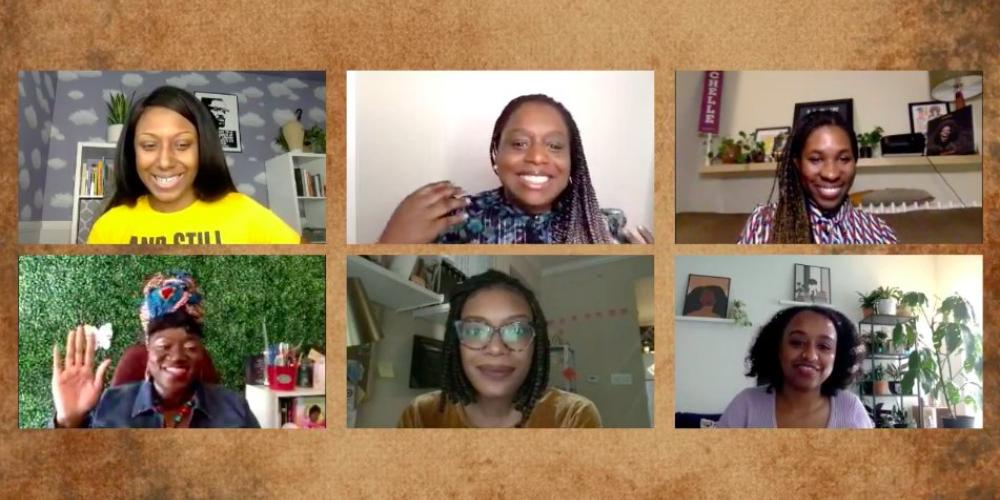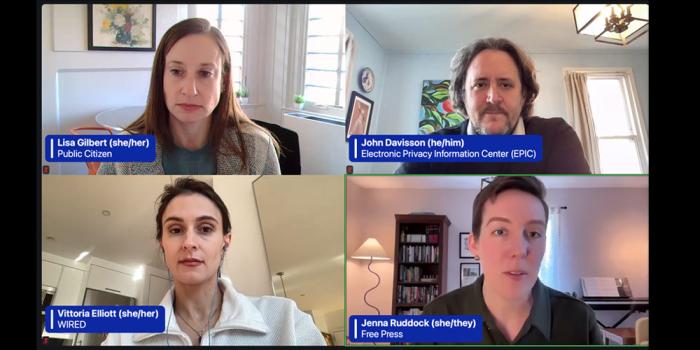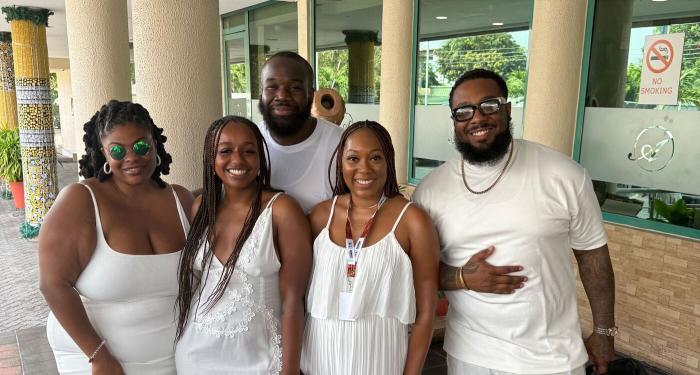A Future Ripe with Black Joy and Self-Determination

February 2021 has been Black Narrative Power month at Free Press.
Our Media 2070 project, in its call to dream up #MediaReparations, has brought together media-makers, journalists and activists for a series of events exploring how to create a future ripe with the capital needed for Black folks to control the creation, production and distribution of their own stories. Here are some highlights from our events:
On Feb. 9, Twitter users across the country joined us in a Twitter storm using the hashtag #BlackFutureHeadlines. Nearly 600 tweets were shared as participants creatively communicated dreams for a future in which reparations have been realized and Black media power is abundant.
On Feb. 16, we jumped on the Clubhouse app for “Black Journalists Uprising,” a live conversation with media-makers who are inspiring transformation in newsrooms from Los Angeles to New York City, featuring Black journalists Erin B. Logan (Los Angeles Times), Alexis Johnson (Vice) and Tauhid Chappell (Free Press). The discussion was moderated by scholar and Peabody-winning podcaster Chenjerai Kumanyika (Rutgers University and the NPR podcasts Uncivil, Seeing White and Louder Than a Riot).
Conversations among the panelists and audience touched on confronting toxic newsroom culture, and envisioning what a Black media future could look like. Panelists discussed their personal experiences with struggling and fighting against racialized censorship, cultural incompetence and discrimination — and how these struggles continue a centuries-old battle to counter erasure of our words, ideals, narratives and history.
One listener asked how newsrooms can balance equitable reporting with the fact that white readers are more likely to purchase digital subscriptions. Alexis Johnson pointed out, “The notion of whether Black people will pay for a subscription starts with your coverage. No one's investing in something that misrepresents their community.”
Tauhid Chappell underscored how Black media ownership can upend this dynamic and many others that make our current media structure inequitable: “If you don't own your own story, it's going to be difficult to change the media apparatus. How can we own whatever infrastructure we need to tell Black stories?”
Media 2070’s Collette Watson brought it all together at the end, stating:
“Change from within the existing structures will help our people be safe, and so it is necessary. But it is not the solution. The only solution we’re offering is solidarity. We have to join forces as Black caucuses, communities and allies in challenging newsrooms to shift power. And ‘power’ means resources as well as decision-making and leadership power. And yes, ultimately that does mean ownership.”
On Feb. 23, we joined our allies at MediaJustice for “Reclaiming Our Story,” a Facebook Live conversation where Black movement journalists and activists explored narratives and shifts that could carry us to a future ripe with Black joy and self-determination. This conversation was moderated by Anoa Changa (host of The Way With Anoa podcast) and featured brilliant perspectives from Diamond Hardiman (Media 2070), DaLyah Jones (Texas Observer), Tia Oso (ACRE) and Bridget Todd (UltraViolet; host of There Are No Girls on the Internet podcast).
During the roundtable, panelists shared their dreams of what Black narrative power looks like, and discussed the obstacles they face to tell their stories honestly and authentically. Check out some of their quotes below:
- “Black narrative power is being able to unapologetically occupy a space or a platform.” —DaLyah Jones
- “Black narrative power is owning our stories and being able to control and advance narratives that we’re centered in.” —Tia Oso
- “Black narrative power is being able to be seen in your fullness and being able to see yourself and your community reflected.” —Diamond Hardiman
- “Having the power to show the full spectrum of Blackness and Black identity, and all of the multifaceted, melanated beauty that comes with it.” —Bridget Todd
Watch the recording of “Reclaiming Our Story” here, and join the conversation on Twitter by following #BlackNarrativesMatter.
And learn more about the Media 2070 project, which is working to radically transform who has the power to tell their own stories by 2070. Check out the team’s visionary essay, which documents the history of racism in U.S. media and tech — and invites people to dream of a future filled with #MediaReparations.




